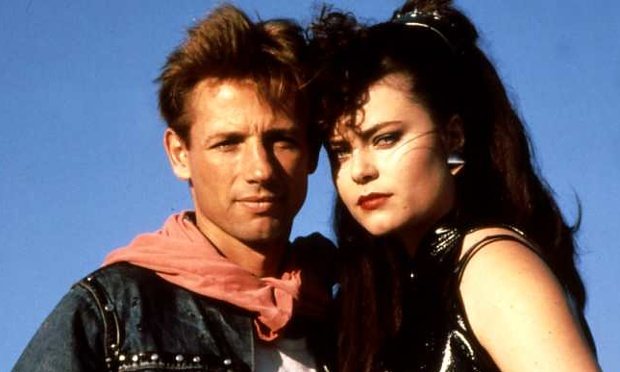Available on Blu-Ray from Tue 20 Sep 2016
The punk subculture took its time to reach the Antipodes. By 1986 the snarling likes of the Sex Pistols and The Damned may have imploded into new wave and New Romanticism, but Brian Trenchard-Smith’s Ozploitation thriller Dead End Drive-In is defined by its punk aesthetic, as much as its biting social commentary.
Based on a short story by no less a literary figure than Peter Carey (Oscar and Lucinda, The True History of the Kelly Gang), the film presents a collapsed society in the near future in which drive-in theatres are remodelled as concentration camps for the wayward youth of Australia. They are fed an easy diet of drugs, fast food, and, ironically, trash cinema. This keeps them under control and out of society’s hair. All the while they are drip-fed the poisoned idea that their lot in society is all the fault of the post-Vietnam influx of Asians to the country.
Our young hero, Crabs (portrayed unconvincingly by the craggy thirty-five year-old Ned Manning) resolves to escape, while girlfriend Carmen (Natalie McCurry) becomes increasingly seduced by the easy consumerism, deciding their lot is better in the compound than outside in the economic wasteland. It’s a brash, snotty take on Reaganomics. It’s also a neat subversion of American symbolism where a car equals freedom. Here it’s the vessel of their entrapment and incarceration. One suspects that Crabs’ choice of car, a ’57 Chevy, isn’t merely circumstantial. There’s a great semiotic and cultural weight to the vehicle which further advances the case for Dead End Drive-In being a thoughtful cut above most of its B-movie brethren.
However, those seeking a Mad Max 2: The Road Warrior thrill ride may be disappointed. For the most part, Trenchard-Smith is interested in the stasis and inertia brought on by incarceration, and the effect this has on the population of the compound. It becomes a prison movie, albeit one with markedly more impressive production values than you would expect. There are lulls in the story as Crabs goes about the Sisyphean task of getting his car functional again. In many ways, he’s the least interesting character, even if some of the supporting cast are more accomplished actors than others.
It’s also noticeable that the subplot of the institutional racism is used purely as a plot catalyst for a final car chase. There is a vague nod to the idea that this xenophobia is a consequence of a lazy populace lulled into herd mentality by the steady consumption of junk – be it food or media – but this is allowed to fizzle out once Crabs finally gets his wheels.
Despite its flaws, Dead End Drive-In is a great example of the low-budget wave of horrors and thrillers that flourished during the 70’s and 80’s in Australia. Once more, Arrow Video have come up trumps tracking down an almost-forgotten slice of top-level trash cinema.


Comments